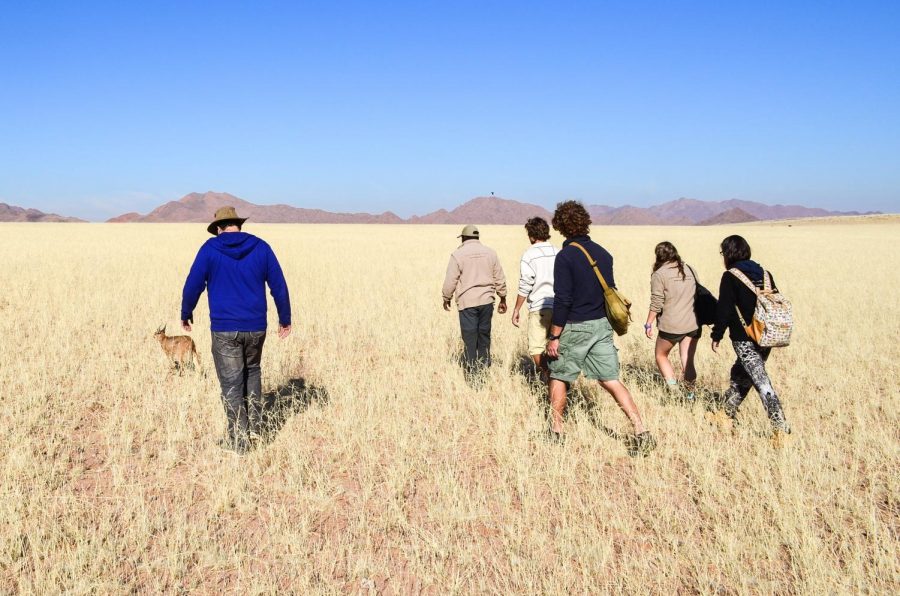Come spring break, it’s common for college students to participate in service-learning experiences around the world. Such trips can include anything from planting trees to teaching computer literacy.
While the desire to “help others” may be well-intended, in recent years, such volunteering trips –dubbed as volunteer tourism, or “voluntourism” – have often been criticized for being more harmful than helpful. Programs can fall under this “voluntourism” label when they focus more on sightseeing or feeling good about “doing good,” than about building genuine relationships with people and providing a service on the community’s terms.
This dynamic of seeking to “help” others in foreign countries is further complicated by the longstanding history of racism and exploitation between western countries and the global south, especially countries in Africa where European colonizers sold people into slavery and continue to exploit their natural resources. Even the language of developed versus underdeveloped fails to look deeper at why certain countries are “underdeveloped” and what criteria are used in this assessment. How this binary is framed also reveals the nature of this relationship between countries, as it is exceedingly rare to instead use terms such as developed versus “overdeveloped.”
An impression that western “do-gooders” often bring back from service learning trips in Africa of poor, but happy Africans can be misleading and even harmful. No White Saviors, a Uganda-based advocacy campaign cautions that, “There is a romanticizing of poor people in over exploited countries and communities that we need us to pay close attention to. People will come and visit, comment on how happy, ‘carefree’ and content some of our poorest citizens appear to be. Do not mistake self-preservation and resilience with satisfaction or security.”
It is within this context that Five College alumnae Nialena Ali, currently a Juris Doctor degree student at Western New England University, and Brittni Howard, currently a doctorate student in cultural anthropology at the University of Massachusetts, sought to create something different. In 2016, they founded Star Service and Study Abroad, where Ali currently works as the director of operations and Howard works as the director of programs. As outlined during a recent presentation of their work at Mount Holyoke College titled “Service without Saviors: Decolonizing Development Work in West Africa,” the pair lead a six-week long service learning trip in Kasoa, Ghana that includes academic and internship experience with organizations that Ali and Howard have cultivated longstanding relationships with.
In order to prepare for working respectfully and ethically, participants study the context behind Ghana’s history, politics and culture, as well as the implications of diversity, race and class privileges. “These conversations…apply to the very work that you’re doing, and so this level of self-reflexivity as far as who am I in the world and what is my positionality in the world ties directly into what am I doing here,” Ali said.
Ali and Howard have several recommendations for how students can find ethical service work that aligns with their goals and interests. They encourage students to be honest about their own skills, look critically at who they will be traveling with, learn what the organization’s history is, and identify who designs the service projects.
Having processes in place for mentorship and task delegation is also important. In Ali’s experience, “We often see an undue burden placed on the host organization where they’re doing things that are not in their title or role at all just to accommodate all of these volunteers.” Seeing that the organization prioritizes participants’ as well as community members’ safety is also crucial. “Here you have a CORI check if you’re going to work in schools,” Ali said. “So what is this organization asking of you when they’re putting you into touch with possibly vulnerable populations?”
In doing this kind of research, Ali encourages students to “embrace a certain level of assertiveness but also humility. And assertiveness in the sense of ask the questions and even if it is, ‘where is my tuition going?’ or ‘are there local people who could be fulfilling this role as well?’…You’re about to give them a whole lot of money, so it’s worth knowing where it’s going.”
“We don’t want people to be discouraged from doing good work in the world, but do it more critically,” reminded Howard. Ali and Howard also discussed how participants can ethically and respectfully relay their experiences via social media and other forms of communication. “We talk about…again, ‘where did this come from, what’s this gaze, what’s the power, and what’s the message? How can you give people respect and the dignity that they deserve as human beings,’” Howard explained.
A quote that Ali often returns to in her work is “Don’t visit Africa for what it lacks, but for what it has.” Examining our place and our own privilege in the context of global history helps us respectfully interact with others. As visitors in a place where we have never lived, and will likely not be living in permanently, it’s important that we are supportive of the communities that we work with, and not just indulging in a “feel good” excursion at someone else’s expense.
Jennie Moss is a Collegian columnist and can be reached at [email protected].



















